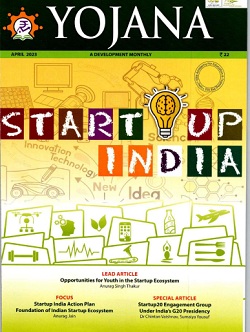
(E-Book) YOJANA MAGAZINE PDF - APRIL 2023
- Medium: ENGLISH
- TOPIC : STARTUP INDIA
- E-BOOK NAME : YOJANA MAGAZINE PDF -APRIL 2023
- Total Pages: 51
- PRICE:
0/- FREE/-
- Hosting Charges: NIL
- File Type: PDF File Download Link via Email
Content Table:
Lead Article
OPPORTUNITIES FOR YOUTH IN THE STARTUP ECOSYSTEM................6
Focus Article:
STARTUP INDIA ACTION PLANFOUNDATIION OF INDIAN STARTUP ECOSYSTEM............15
SPECIAL ARTICLE :
STARTUP 20 ENGAGEMENT GROUP.......20
- Dr.Chintan Vaishanav
- Sumaiya Yousfu
WOMEN ENTREPRENEURSHIP IN MSME SECTOR........37
OPPRTUNITIES FOR MSMEs IN 'AMRIT KAL'............43
STARTUPS REACHING THE LAST MILE...........50
ANTYODAYA AND MASS MEDIA.......55
Regular:
DO YOU KNOW ?
INCUBATORS-THE GROWTH ENABLERS.......61
C-3 DEVLOPMENT ROADMAP
CREATING A CONDUCIVE BUSINESS ENVIROMENT

Related E-Books: